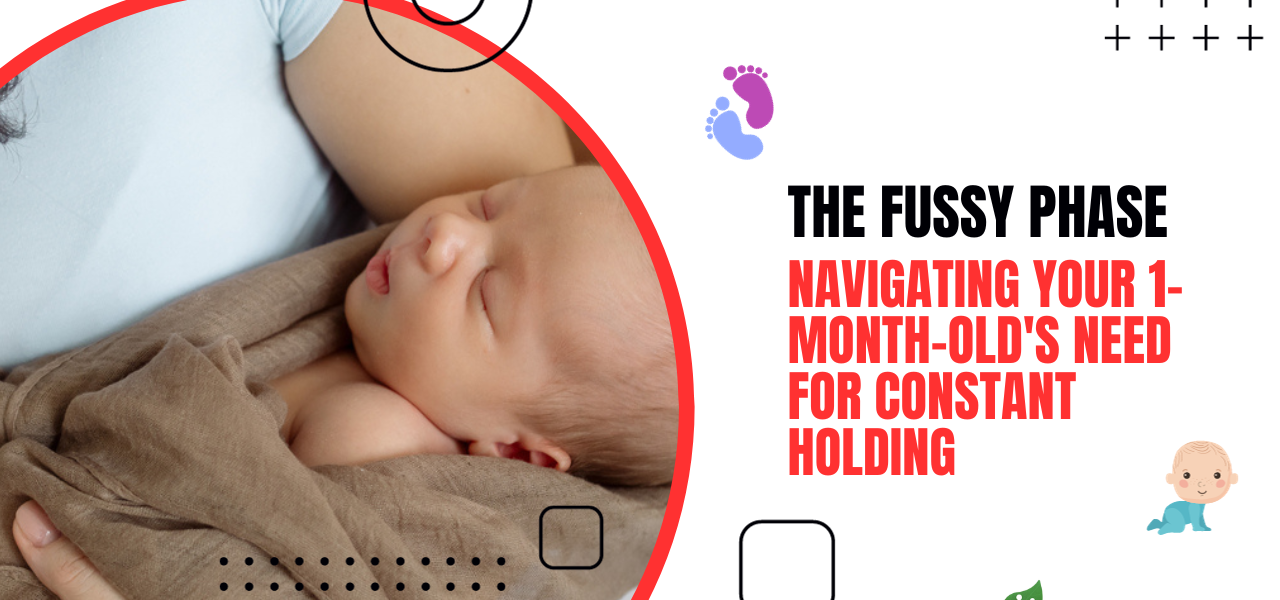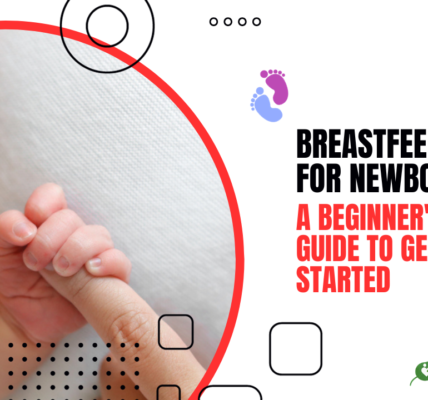Decoding Fussiness in Your 1-Month-Old: Understanding the Need for Constant Holding
Understanding the intricacies of a 1-month-old’s behavior is pivotal for parents navigating the early stages of their baby’s development. This period often brings a multitude of changes, and deciphering why is my 1 month old so fussy and seeking constant holding can alleviate parental concerns and foster a deeper connection with the infant.
Why is My 1 Month Old so Fussy: Reasons Behind a 1-Month-Old’s Fussiness
Growth Spurts and Hunger Pangs
Babies undergo rapid growth at this stage, leading to increased appetite and fussiness. These growth spurts are normal and signify healthy development.
Colic and Digestive Discomfort
Digestive issues like colic or gas can cause discomfort and agitation, resulting in prolonged crying spells in infants.
Sensory Overload and Overstimulation
A newborn’s sensory system is still developing, making them susceptible to overstimulation from external stimuli, leading to fussiness.
Need for Comfort and Security
Babies seek comfort and security, and being held close to a caregiver provides the warmth and reassurance they crave.
Strategies to Navigate Your Baby’s Fussy Phase
Soothing Techniques
- Swaddling: Wrapping your baby snugly can mimic the secure feeling of the womb.
- Gentle Rocking: Gentle rocking or rhythmic movements can soothe a fussy baby.
- White Noise: Sounds like a fan, white noise machine, or shushing mimic comforting womb sounds.
Feeding and Nutrition
Understanding hunger cues and feeding patterns helps distinguish between hunger and fussiness due to other reasons like discomfort.
Establishing Consistent Routines
Consistency in routines for feeding, sleeping, and playtime can provide predictability and comfort for the baby.
Skin-to-skin contact and Bonding
Encouraging frequent skin-to-skin contact aids in bonding and provides comfort to the baby.
Additional Strategies to Soothe a Fussy 1-Month-Old
Baby Massage Techniques:
- Gentle Strokes: Using light, circular motions on the baby’s back or tummy can aid in relaxation.
- Leg Cycling: Gently moving the baby’s legs in a cycling motion can ease gas discomfort.
Environmental Modifications:
- Soft Lighting and Quiet Environment: Creating a calm atmosphere during fussy periods can reduce overstimulation.
- Comfortable Temperature: Ensuring the baby is neither too hot nor too cold promotes comfort.
Babywearing:
- Utilizing baby carriers or wraps allows for constant contact while allowing parents to attend to other tasks, providing comfort to the baby.
Addressing Parental Stress and Concerns
Coping Mechanisms for Parents
Providing self-care tips such as taking breaks, seeking support, and resting when possible helps manage parental stress.
Building a Support Network
Encouraging parents to seek guidance and support from family, friends, or parenting groups can alleviate stress.
Tips for Parents Coping with a Fussy Baby
Take Breaks and Rest:
- It’s crucial for parents to take breaks to recharge. Ask for help from a partner, family member, or friend to provide relief.
Practice Self-Care:
- Allocating time for self-care activities like a short walk, reading, or relaxing baths helps alleviate stress.
Monitor Your Baby’s Cues:
- Understanding your baby’s cues and responding promptly can prevent fussiness from escalating.
Seek Professional Support:
- If the fussiness persists or intensifies and causes concern, consulting a healthcare professional can provide guidance and reassurance.
Understanding the Role of Parental Stress
Impact of Parental Stress on the Baby:
- High-stress levels in parents can influence a baby’s behavior, potentially contributing to increased fussiness.
Stress Management for Parents:
- Techniques such as deep breathing exercises, meditation, or yoga can help reduce stress levels.
Encouraging Bonding and Positive Interaction
Engage in Interactive Activities:
- Talking, singing, and making eye contact during calm periods fosters bonding and reassures the baby.
Share Responsibilities:
- Encouraging active involvement from partners or other family members helps in sharing the load and fostering a supportive environment.
Understanding Developmental Changes
Cognitive and Sensory Development:
- Explain how a baby’s cognitive and sensory development at this stage can lead to increased sensitivity and fussiness.
Growth and Weight Gain:
- Highlight the importance of frequent growth spurts at this age, often accompanied by increased feeding demands and fussiness.
Special Considerations for Breastfeeding Mothers
Breastfeeding Techniques:
- Offer guidance on proper latch, positioning, and cues to ensure effective feeding and reduce instances of fussiness due to hunger.
Dietary Considerations:
- Discuss potential maternal dietary factors that might contribute to a baby’s fussiness and offer advice on maintaining a balanced diet.
Seeking Support from Healthcare Professionals
Recognizing Signs of Concern:
- Outline specific symptoms that warrant attention, such as persistent crying, fever, or unusual changes in behavior.
Importance of Pediatric Consultation:
- Emphasize the significance of seeking professional advice if parents have ongoing concerns about their baby’s fussiness or behavior.
Parental Well-Being and Support Systems
Online Parenting Communities:
- Highlight the benefits of joining online parenting forums or communities for sharing experiences and seeking advice.
Local Support Groups:
- Encouraging parents to engage in local parenting groups or attend classes can provide additional support and guidance.
Encouraging Communication and Patience
Open Communication:
- Emphasize the importance of open communication between parents, creating a united approach in handling their fussy baby.
Patience and Understanding:
- Reiterate that coping with a fussy 1-month-old requires patience and understanding, assuring parents that it’s a passing phase.
FAQs – Frequently Asked Questions of Why is My 1 Month Old so Fussy
Q 1: What is considered normal fussiness in a 1-month-old?
Ans 1: It’s normal for a 1-month-old to be fussy for up to 2-3 hours a day. This fussiness often occurs in the late afternoon or evening.
Q 2: How often should I expect my baby to be fussy during the day?
Ans 2: Fussiness in a 1-month-old can occur intermittently throughout the day, typically peaking during growth spurts or due to discomfort.
Q 3: Does frequent holding spoil a infant?
Ans 3: No, frequent holding or cuddling does not spoil a infant. Babies have an innate need for closeness and reassurance, especially during the early months.
Q 4: Could my baby’s fussiness be due to discomfort from clothing?
Ans 4: Yes, uncomfortable clothing, tags, or seams may irritate a baby’s sensitive skin, leading to increased fussiness.
Q 5: Are there specific feeding positions that can help with colic?
Ans 5: Gentle feeding positions like upright holds or keeping the baby slightly inclined may ease discomfort caused by colic or gas.
Q 6: Should I avoid certain foods if my baby is gassy or fussy?
Ans 6: In some cases, breastfeeding mothers may notice changes in their baby’s fussiness after consuming certain foods. Experimenting with diet changes, like avoiding dairy or gas-inducing foods, may help.
Q 7: Is there a connection between my stress levels and my baby’s fussiness?
Ans 7: Yes, parental stress can sometimes influence a baby’s fussiness. Babies may pick up on stress cues, affecting their behavior. Implementing stress management techniques can positively impact your baby’s mood.
Q 8: Can the fussiness extend beyond the first month?
Ans 8: Fussiness may persist beyond the first month due to growth spurts, developmental changes, or environmental factors. However, as the baby adjusts, fussiness often decreases.
Q 9: Should I be concerned if my baby’s fussiness suddenly increases?
Ans 9: A sudden increase in fussiness might warrant attention, especially if accompanied by other symptoms like fever or changes in feeding patterns. Consulting a pediatrician can help rule out any underlying issues.
Q 10: How can I differentiate between a medical issue and normal fussiness in my baby?
Ans 10: Look for additional signs such as persistent high-pitched crying, fever, unusual stool consistency, or feeding difficulties. If you’re uncertain, seeking medical advice is recommended.
Conclusion: Nurturing a Fussy 1-Month-Old with Care and Understanding
Dealing with a fussy 1-month-old demands a mix of patience, understanding, and proactive steps to manage their needs effectively. By acknowledging the various developmental factors and employing the strategies and support systems available, parents can navigate this phase with more confidence, fostering a nurturing environment for their baby’s growth and well-being.
Remember, you are not alone in this journey. Many resources and healthcare professionals are available to support you parenting endeavors. For more information on parenting and child development, visit Parentology.





